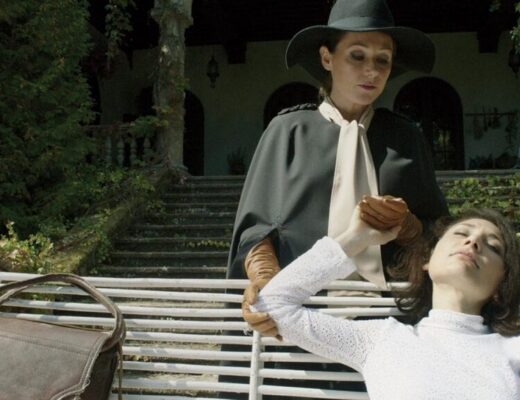From its title alone, Gastón Solnicki’s latest film suggests that it avoids grand statements, instead choosing to offer an assemblage of conceptual lagniappes, ideational odds and ends. As opposed to his previous feature Kékszakállú, which was rather airtight on a formal and conceptual level, A Little Love Package is a loose-limbed, meandering film. Inasmuch as Solnicki provides a narrative, it centers on two women at crossroads in their lives. Angeliki (Angeliki Papoulia) has come into some wealth, and wants to buy a home in Vienna. Her friend Carmen (Carmen Chaplin), an interior decorator, is assisting Angeliki with her property search. But Angeliki finds fault with every place they find — bad heating, creaky floorboards, a disagreeable landlord — an attitude that eventually tries Carmen’s patience.
It’s suggested that Angeliki wants to live in a classic Old World house, but is unwilling to accept that such a choice brings certain compromises along with it. This frustrating sense of wanting it both ways kind of characterizes A Little Love Package as a film. It is somewhat character-driven, but at the same time it is content to simply look at and listen to its environment. Recalling neoclassical works like Pere Portabella’s The Silence Before Bach and Otar Iosseliani’s Farewell Home Sweet Home, A Little Love Package asks us to consider the fate of traditional practices in the modern world. Whether it’s the discipline of the concert pianist (Lee Han-Gyeol) or the waxing of giant wheels of artisanal cheese, Solnicki is content to simply articulate the coexistence of different generations and their conflicting cultural imperatives.
In a way, A Little Love Package is a logical offshoot of his little-seen 2018 documentary Introduzione all’oscuro, his goodbye letter to his friend Hans Hurch, the late director of the Viennale. Both films share a preoccupation with café culture, and A Little Love Package opens with a mournful consideration of Austria’s smoking ban. Change entails immediate loss, usually in order to secure an as-yet-uncertain future. This problem becomes unexpectedly explicit in the film’s final act, when we follow Carmen back to her parents’ home in Andalusia. She is visiting primarily because her elderly father (Michael Chaplin) is in poor health. Carmen’s sister (Dolores Chaplin) upbraids her for having left home in the first place, and while Carmen is considering moving back, her young daughter (Alma Sutterlüty) aggressively rejects that idea. She considers the Spanish countryside to be a “dump.”
This sudden turn toward familiar family dynamics is rather strange, since it leads Solnicki into the kind of dramatic territory A Little Love Package had so assiduously avoided up to that point. But perhaps this is the filmmaker’s way of turning his themes on himself. That is, the choice to abjure time-honored narrative structures brings both liberation and complication, allowing certain effects to emerge at the expense of others. It seems churlish to note that A Little Love Package doesn’t hang together, since it is quite evident that Solnicki doesn’t want it to. The film suggests that seismic cultural and historical changes are experienced as undefined glimmers and small-scale resistances. But in taking this position, A Little Love Package is profoundly unwilling to clarify the ramifications of these shifts for the people involved. It’s a passive-aggressive film, in good ways and bad.
Published as part of Berlin Film Festival 2022 — Dispatch 3.







